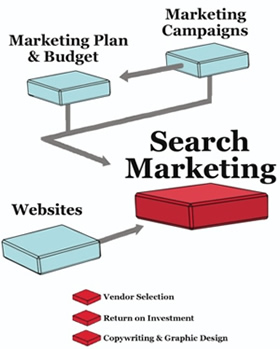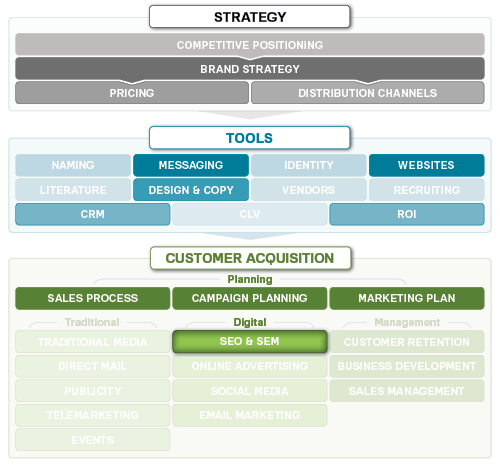Marketing Guides
Campaigns & Execution
How to Use Search Engine Marketing
Search engine marketing is about gaining visibility on search engines when users search for terms that relate to your business. For most companies, ranking highly in search results isn’t luck – it’s a result of solid effort in one or both categories of search marketing:
- Organic search (SEO): When you enter a keyword or phrase into a search engine like Google or Yahoo!, the organic results are displayed in the main body of the page.When your prospects search for information about your products and services, you want to rank highly in search engine results. By “optimizing” your site, you can improve your ranking for important search terms and phrases (“keywords”). You can also improve your rank by getting other important sites to link to yours.
- Paid search (SEM) enables you to buy listings in the “sponsored” area of a search engine. There are a variety of paid search programs, but the most common is called pay-per-click (PPC), meaning you only pay for a listing when a prospect clicks your ad.
In search engine marketing, companies focus on driving more traffic to targeted areas of their website. They understand how to use search engine marketing to:
- Generate new leads
- Sell products
- Build their brand
- Divert traffic from their competitors
Studies show that most business people research their problems, potential purchases and vendors online and use a search engine in the process. And the higher the price of the product/service, the earlier they search.
For many businesses, generating only a handful of additional serious prospects can make a substantial difference in revenue. Knowing how to use search engine marketing effectively may efficiently produce these additional prospects.
| Best Case | Neutral Case | Worst Case |
|---|---|---|
| You’re generating very targeted prospects through your search marketing programs.
Your site is optimized and you’ve built a lot of important incoming links, so you rank well in organic results for targeted searches. You use paid search to supplement that traffic and you create custom landing pages for your campaigns to convert visitors into prospects. |
You’ve built a new website and it’s been optimized for search, but you don’t rank in the top 10 for anything but your company name.
You’ve tried some paid search with good success; your conversion rates on the traffic are okay but could be better. You know that search marketing is a solid opportunity – you’re just figuring out how to improve your results. |
Your website isn’t optimized for search and you’re nowhere to be found on search engines, even for very targeted terms.
In fact, you may not even rank for searches on your company name. Unfortunately, your competitors show up on the first and second pages for the terms your prospects use; as a result, your competitors are winning new business and furthering their lead in the market. |
Not Sure How to Use Search Engine Marketing?
Access detailed step-by-step plans in our new marketing website.
It’s free to use

How to Use Search Engine Marketing Effectively
Before you begin
Depending on your search strategy, you may need to make major or minor improvements to your website.
Create your search strategy
Look at your short- and long-term goals to choose whether to focus on organic or paid search (or both). It takes time to improve your organic search rankings, but you can launch a paid search campaign tomorrow. However, there are other considerations: the amount of traffic you need, your budget, and your marketing objectives. Once you’ve reviewed the pros and cons, you can select the search strategy that’s right for you.
Generate a list of keywords
Before you can optimize your site or launch a paid campaign, generate a list of keywords – terms your prospects use when looking for information you can deliver. You can brainstorm, copy keywords from competitors, or use online tools to generate a list and traffic estimates.
Optimize your website
- Rewrite your content so it’s rich with the keywords you’ve chosen.
- Make sure the content is organized in the best possible manner.
- Eliminate any technologies that prevent search engines from reading your content (for example, search engines can’t read graphics or Flash content).
- Register your site in important directories that play a vital role in search engine results.
Generate inbound links
Search engines reward you when sites link to yours – they assume that your site must be valuable and you’ll rank higher in search results. And the higher the “rank” of the sites that link to you, the more they count in your own ranking. You want links from popular industry authorities, recognized directories, and reputable companies and organizations.
Implement additional internet campaigns
These programs can improve your search results:
- Utilizing social media
- Creating RSS feeds to distribute updated content from your site to other websites
- Including a blog on your site
- Distributing search-optimized press releases on the web
Start testing paid search
To begin using paid search, you’ll
- Develop targeted landing pages for each campaign
- Write your ad(s)
- Create an account with a search network that’s important to business users (i.e. Google)
- Set up your campaign with the network
- Start tracking your results
After Learning How to Use Search Engine Marketing
Focus on converting your new prospects to customers, then keep the cycle going. Continue learning to keep optimizing your website and SEM campaigns. Read Matt Cutts’ blog to stay abreast of Google’s best practices.
SEARCH ENGINE MARKETING TEMPLATES / MARKETING PLANS / PROJECT MANAGEMENT
EVERYTHING YOU NEED FOR YOUR SEARCH ENGINE MARKETING PROJECT
